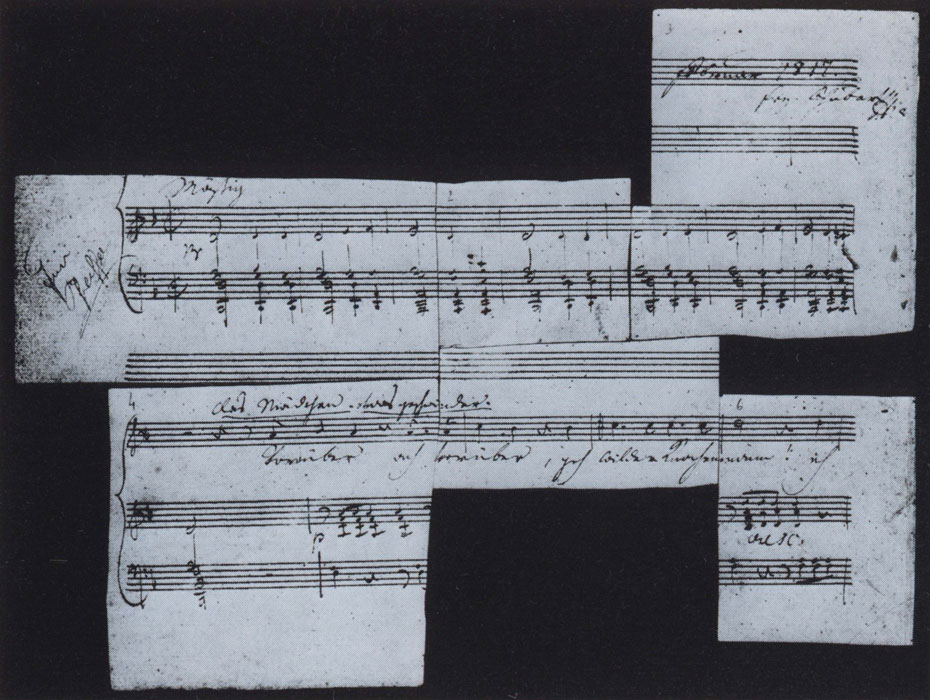Schubert manuscripts and ‘acts of piety’: sourcing a Wittgenstein anecdote
by Sebastian Smallshaw
Music didn’t dominate Ludwig Wittgenstein’s thinking to the extent it did Theodor Adorno’s, but it was a significant preoccupation, and music appears persistently in Wittgenstein’s writings and correspondence as the subject of observations, aphorisms and analogies. One such musical reference, which Wittgenstein parenthesizes in his Remarks on Frazer’s Golden Bough , alludes to an obscure episode in the ownership history of Schubert’s manuscript fragments:
‘Recall that after Schubert’s death his brother cut some of Schubert’s scores into small pieces and gave each piece, consisting of a few bars, to his favourite pupils. This act, as a sign of piety, is just as understandable to us as keeping the scores untouched, accessible to no one. And if Schubert’s brother had burned the scores, that too would be understandable as an act of piety.’
The Wittgenstein biographer Ray Monk asked me via Radmila Schweitzer, the General Secretary of the Wittgenstein Initiative, if this story was true, and where Wittgenstein might have heard it. A few recent studies have addressed Wittgenstein and matters of music – James K. Wright’s Schoenberg, Wittgenstein and the Vienna Circle and Katrin Eggers’ Ludwig Wittgenstein als Musikphilosoph are two book-length examples – but nowhere does it seem that a source for this Schubert remark, minor footnote that it might be, has been proposed. As it happens, a trail that plausibly led Wittgenstein to this story can be pieced together without much difficulty.
The image above shows an autograph fragment of the song ‘Der Tod und das Mädchen’ (D 531), one of Schubert’s most recognized Lieder, cut up exactly how Wittgenstein describes. The revised German edition of O. E. Deutsch’s catalogue of Schubert’s works offers the following information: ‘According to a note by E. Mandyczewski dated 15/6/1917, the autograph page had been cut up by Schubert’s half-brother Pater Hermann Schubert, whose initials appear on the original recto side, in order to give [the pieces] to some of his students as awards.’1) Hermann was the ordained name of Anton Eduard Schubert (1826-1892), a popular Benedictine priest.
Eusebius Mandyczewski (1857-1929) came to Vienna aged 18 from the eastern periphery of the Austro-Hungarian empire, studied music history at the Vienna Conservatory with illustrious names including Eduard Hanslick and Martin Gustav Nottebohm, and made his mark as a musician and scholar before being appointed archivist of the Gesellschaft der Musikfreunde in 1887, a post he held until his death. D 531 was not the only fragment which came his way via Schubert’s relatives: in 1907 he prepared (for first publication) two song settings of Goethe, ‘Jägers Abendlied’ (D 215) and ‘Meeres Stille’ (D 216), for which autographs were presented to him by Anna Siegmund, the daughter of another half-brother of the composer, Andreas Schubert (1823-1893).
As the curator of Johannes Brahms’s estate, which remains to this day in the Gesellschaft der Musikfreunde archive, Mandyczewski was close to Brahms and is named in Max Kalbeck’s biography as one of the guests Brahms brought along to musical evenings at the palatial Wittgenstein residence on Vienna’s Alleegasse 2). Mandyczewski must have established some rapport with the family on such occasions, and so much is suggested in a Wittgenstein-related letter written in 1913, some years after Brahms’s death, by the music theorist Heinrich Schenker 3). At this time Schenker was in the middle of editing the last five piano sonatas of Beethoven, and due to his methodical working style (this Beethoven edition would become a major event in music editing) required multiple visits to the Wittgenstein house, which housed the autograph manuscript to one of the sonatas. In this 1913 letter to his publisher, Schenker writes vividly about his Alleegasse visits, getting rather grouchy in characteristic Viennese style about how fiercely the manuscript was guarded. Implied is that the Wittgenstein matriarch Leopoldine (fn. 11) would only allow supervised access, and on one of Schenker’s return visits he was overseen by Paul Wittgenstein. But on Schenker’s first visit the supervisor had been Mandyczewski, supplying not only specific manuscript-related business Mandyczewski had in the Alleegasse but also indicating he had the Wittgensteins’ presumably hard-earned trust in these matters.
Besides placing Mandyczewski among the Wittgensteins, sources also reveal that he mentioned his dealings with Schubert’s family and their keepsakes when in social company. That Mandyczewski actually told the story of the Schubert fragments to Brahms himself is documented quite satisfactorily in the foreword to the published correspondence between Brahms and the eminent surgeon Theodor Billroth 4). Here, Otto Gottlieb-Billroth (Billroth’s son-in-law) addresses the key incidents which put strain on the close friendship between the two men, one of which was what Billroth did to honour Brahms’s dedication and gifting of the manuscript to the A minor string quartet (op. 52/II), which involved cutting out a fragment of handwriting from the title page and affixing it to a Brahms portrait which hung in his study. To Brahms, who cherished manuscript scores, it was vandalism, a viewpoint not shared by Billroth, who dismissed autograph collecting as ‘fetishism’. Gottlieb-Billroth proceeds: ‘Much later (in conversation about a Schubert manuscript, which Schubert’s brother had cut into pieces and distributed to various people as souvenirs) Brahms commented quite heatedly to Mandyczewski: “Now just think, Billroth also cut up my quartet, can you imagine! And yet must have known that I’m so fond of him that I’d copy out the entire quartet again if he so wished! And snip a piece out of that!”
Wittgenstein’s version of the story has taken on a life of its own and become far more discussed by philosophers than the source has been by Schubert scholars, and of course what Wittgenstein reads into it, with his observation about the instinctive intelligibility of ritual acts, is a different kind of insight to the textual commentary which goes into critical editions. The most interesting thing about tracing Wittgenstein’s source in this way is perhaps for the example it provides of the privileged social and cultural context – what Allan Janik writes of in these pages as Vienna’s ‘second society’ – from where his patchwork musical knowledge came.
Sebastian Smallshaw studied music at Cambridge University and lives and works in Vienna.
1)In the original German: ‘Das autographe Blatt hat nach einer Notiz E. Mandyczewskis vom 15.6.1917 bereits Schuberts Halbbruder Pater Hermann Schubert, dessen Initialen auf der ursprünglichen Vorderseiten stehen, zerschnitten, um sie einzelnen seiner Schüler als Auszeichnung zu schenken‘. Deutsch, O. E. (1978). Franz Schubert. Thematisches Verzeichnis seiner Werke in chronologischer Folge. Kassel: Bärenreiter, p.310.
2)Kalbeck, M. (1915). Johannes Brahms. Band 4. Berlin: Deutsche Brahms-Gesellschaft, p.507.
3)Handwritten letter from Heinrich Schenker to Emil Hertzka, dated 19th July 1913. Transcribed by Ian Bent on the Schenker Correspondence Project website, 2008: http://mt.ccnmtl.columbia.edu/schenker/correspondence/letter/wslb_167_7-19-13.html.
4)In the original German: ‘Noch viel später (im Gespräch über ein Schubert-Manuskript, das der Bruder Schuberts in Zettelchen zerschnitten und so an verschiedene Leute als Andenken verteilt hatte) äußerte sich Brahms ganz aufgeregt zu Mandyczewski: „Nu, denken Sie nur, auch Billroth hat mein Quartett zerschnitten, denken Sie! Und mußte doch wissen, daß ich ihn so lieb habe, daß ich ihm, wenn ich ihm damit einen Wunsch erfülle, auch das ganze Quartett noch einmal abschreibe! Und schneidet da ein Stück heraus!“’ Gottlieb-Billroth, O. ed. (1935). Billroth und Brahms im Briefwechsel. Berlin: Urban & Schwarzenberg, p.28.

